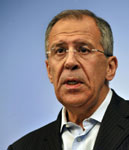 Reuters: Russian Foreign Minister Sergei Lavrov stayed away from a meeting of six world powers on the sidelines of the U.N. General Assembly last week because he had to attend another “urgent matter,” Russia’s U.N. mission said on Wednesday. By Louis Charbonneau
Reuters: Russian Foreign Minister Sergei Lavrov stayed away from a meeting of six world powers on the sidelines of the U.N. General Assembly last week because he had to attend another “urgent matter,” Russia’s U.N. mission said on Wednesday. By Louis Charbonneau
 UNITED NATIONS (Reuters) – Russian Foreign Minister Sergei Lavrov stayed away from a meeting of six world powers on the sidelines of the U.N. General Assembly last week because he had to attend another “urgent matter,” Russia’s U.N. mission said on Wednesday.
UNITED NATIONS (Reuters) – Russian Foreign Minister Sergei Lavrov stayed away from a meeting of six world powers on the sidelines of the U.N. General Assembly last week because he had to attend another “urgent matter,” Russia’s U.N. mission said on Wednesday.
Last week, a foreign ministerial-level meeting was convened in New York with the five permanent U.N. Security Council members – The United States, France, Britain, Russia and China – and Germany. The meeting was inconclusive, diplomats said.
European Union foreign policy chief Catherine Ashton also attended the meeting. She said afterword participants had “discussed at length the need for Iran to take action urgently as we considered the Iranian nuclear issue.”
But in what U.N. diplomats said could be a sign of the growing divide between Russia and Western powers on Iran and Syria, Lavrov was not at the meeting. Russian U.N. Ambassador Vitaly Churkin attended instead.
A spokesman for Russia’s U.N. mission confirmed Lavrov’s absence, saying: “The Minister had to attend to some other urgent matter, as far as I know.”
Chinese Foreign Minister Yang Jiechi attended, envoys said.
The meeting of the so-called “P5-plus-one” group came on the same day that Israeli Prime Minister Benjamin Netanyahu drew his “red line” for Iran’s nuclear program, on Thursday, saying Tehran may be on the brink of an atom bomb in less than a year.
He suggested Israel might have to make a decision on whether to attack Iran’s nuclear facilities by spring 2013.
Iran is under U.N., U.S. and European Union sanctions for refusing to halt nuclear enrichment, which Western powers and their allies fear is part of a plan to amass the capability to produce nuclear weapons. Tehran denies the charge, saying its atomic work is for medicine and generating electricity.
Diplomats said Britain, France and Germany’s calls ahead of the U.N. General Assembly session for additional EU sanctions against Iran could have been a reason for Lavrov’s absence. Moscow has repeatedly criticized unilateral U.S. and EU sanctions against Tehran.
RESISTS SANCTIONS ON SYRIA
One senior Western diplomat told Reuters the Security Council would never adopt another round of sanctions against Iran because of Russian and Chinese resistance.
Russia, Western diplomats say, has become increasingly resistant to Western powers on Iran and the 18-month-long conflict in Syria, which they say Tehran is exacerbating by supplying weapons to Syrian President Bashar al-Assad.
Moscow and Beijing have vetoed three resolutions criticizing Assad’s crackdown on the revolt in Syria against his autocratic regime and have said they would not support sanctions.
Russia and China have reluctantly supported four rounds of U.N. sanctions against Iran over its nuclear program but worked hard to water down the measures in negotiations on the Security Council resolutions prior to their adoption.
For nearly 10 years, the six powers have negotiated unsuccessfully with Iran to persuade it to halt its nuclear program in exchange for political and economic incentives.
Israeli officials say Netanyahu’s “red line” will have been crossed when Iran amasses enough uranium enriched to a level of 20 percent of the fissile isotope uranium-235 for one bomb.
That, the officials say, is the point when Netanyahu says Tehran could no longer be stopped from obtaining an atomic weapon, even though it would still need to enrich the uranium further to the point where it was weapons grade – over 90 percent uranium-235.
U.S. Secretary of State Hillary Clinton held out the possibility on Wednesday that sanctions on Iran could be eased quickly if Tehran worked with major powers to address questions about its nuclear program.
(Reporting Louis Charbonneau; editing by Todd Eastham)


